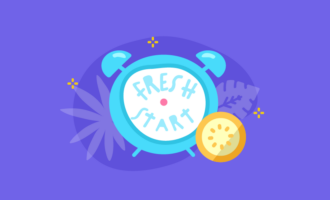It’s no secret that burnout is a big problem. A recent Gallup poll found that two-thirds of Americans who work full-time experience burnout on the job.
What’s the best solution for preventing the negative effects of burnout? For many stressed-out workers, the obvious way forward is to find some balance. If work is taking over your personal life, it makes sense you’d want to make an adjustment.
Finding the right formula to achieve optimal work-life balance seems like an easy way out of the burnout cycle. But in my experience, looking for the perfect balance can be just as stressful as over-working. And if we focus on it too much, it can actually contribute to burnout.
Imagine spending your already-limited energy searching for the perfect recipe for how much you should work, how much you should rest, and how much you should invest in friends, family, and hobbies.
Personally, I’m not sure I’d have much left to give in any of those areas of my life if I spent all my time worrying about achieving balance.
All of us want to feel like our personal lives and work lives aren’t at odds so we can experience less stress and, ultimately, greater fulfillment. That’s a noble pursuit. But I’m convinced the pressure we put on ourselves to create an “either/or” life is just as problematic as the actual work.
Balance isn’t realistic
One reason work-life balance won’t work? According to sociologist Tracy Bower, author of Bring Work to Life by Bringing Life to Work: A Guide for Leaders and Organizations, the concept of “balance” simply isn’t realistic.
No matter how we try to separate them, work will always be a part of our lives, just as our personal lives will impact the way we work. That’s because we are whole people, not fragmented identities.
Bower argues that allowing these parts of our lives to coexist can actually improve our lives.
“When you think of work as part of a full life and a holistic experience,” she says, “it becomes easier to see that success in one aspect often supports another.”
Practically, there will be plenty of times these areas overlap, throwing off our sense of equilibrium. This is normal and expected — and it happens to me frequently.
There are nights when I stay at the office late to finish up on a project, but that doesn’t mean my whole life is out of balance. It means I feel inspired and motivated.
Similarly, there are other days when I cut out early to meet up with friends or family. But that doesn’t mean I’m neglecting work — it just means I’m responding to my needs and the needs around me.
Life ebbs and flows, and when we try to put it in a box, we miss out on opportunities to be thoughtful about how we spend our time.
Balance sets the stakes too high
I had the idea for Jotform when I was working at another tech company. “Balance” was hard to come by in those days, when I spent 9–5 in the office and 5-midnight at home, building my own business.
After one particularly long night (let’s just say there was a lot of coffee involved in my morning), I told myself I’d aim for more balance going forward. I’d set one night a week to work on Jotform, and leave the rest for weekends.
The problem was, this “all-or-nothing” mindset set me up to fail, and it could have kept me from listening to my instincts.
One night after I returned home from my day job, I had a great idea for a feature I wanted to build into the app. I didn’t have any plans that evening, so I got out my laptop and started coding.
The work paid off. But I still felt like a failure, as though I had lost this crucial “balance.”
In general, that kind of mindset sets the stakes too high. Think about it: Losing your balance implies failure or injury, both of which are high-risk situations.
If fear of “losing balance” is always at the forefront of our minds, we won’t have the energy we need to perform in either situation — not to mention, we won’t experience much joy while we do it.
Balance exhausts us
It’s only natural that we would want to prevent burnout — it’s exhausting to feel disconnected and unmotivated. But there’s emerging evidence suggesting that attempting “balance” might not be worth the trouble.
In fact, creating artificial separations between work and life could actually increase the likelihood of burnout.
Recent research explores a concept called “cognitive transitions,” or the work it takes us to mentally toggle from one situation or role to another.
If we keep work and life distinct, for example, we will have to “turn off” our work mind and “turn on” our home mind when we walk in the door. This switch takes — not surprisingly — work.
One study, published in Human Relations, found that people with looser boundaries between home and work experienced more cognitive transitions, but they were less drained by them.
Basically, the more rigid we are, the more work we have to do. So trying too hard to keep our home and work lives separate could have the opposite effect we intended, making us less effective in both areas.
A better way forward: align your priorities with your time
I find it funny that striving for work-life balance — quitting the “hustle” — is its own kind of hustle. For me, what works better than a rigid, objective approach is taking time to reflect on my priorities.
When what I value is at the forefront of my mind, my own natural version of “balance” follows.
Facebook VP Julie Zhuo recommends sitting down to evaluate your top 3 to 5 values, then periodically checking in to make sure your intentions are aligned with reality.
For example, she says, if your top life priority is “raise my kids to be kind, happy, and productive citizens with strong values,” but hanging out with your kids is only number 20 on the list of how you actually spend your time, there’s an issue.
If you’re tempted to stay late at work to finish a project, think about those values. What will be most beneficial and rewarding? Being the last one in the office or coming home early to play video games with your kids?
Take some time to decide what makes the most sense for you rather than labeling situations as “right” and “wrong.”
Remember: Balance isn’t objective, and you’re not a machine. Instead of trying to fit your work and life into a box, listen to what brings you fulfillment and empowers you to make an impact — and try to spend your time accordingly.















Send Comment: